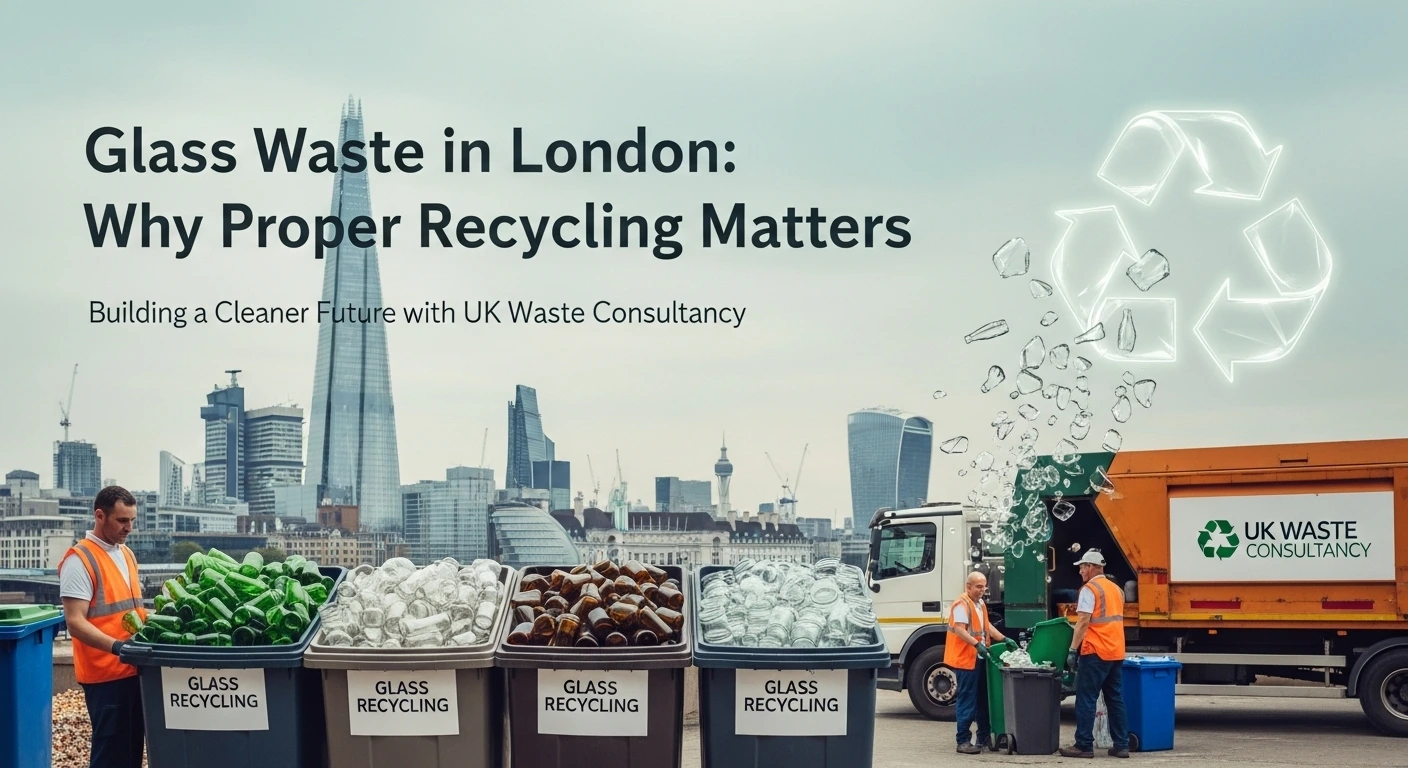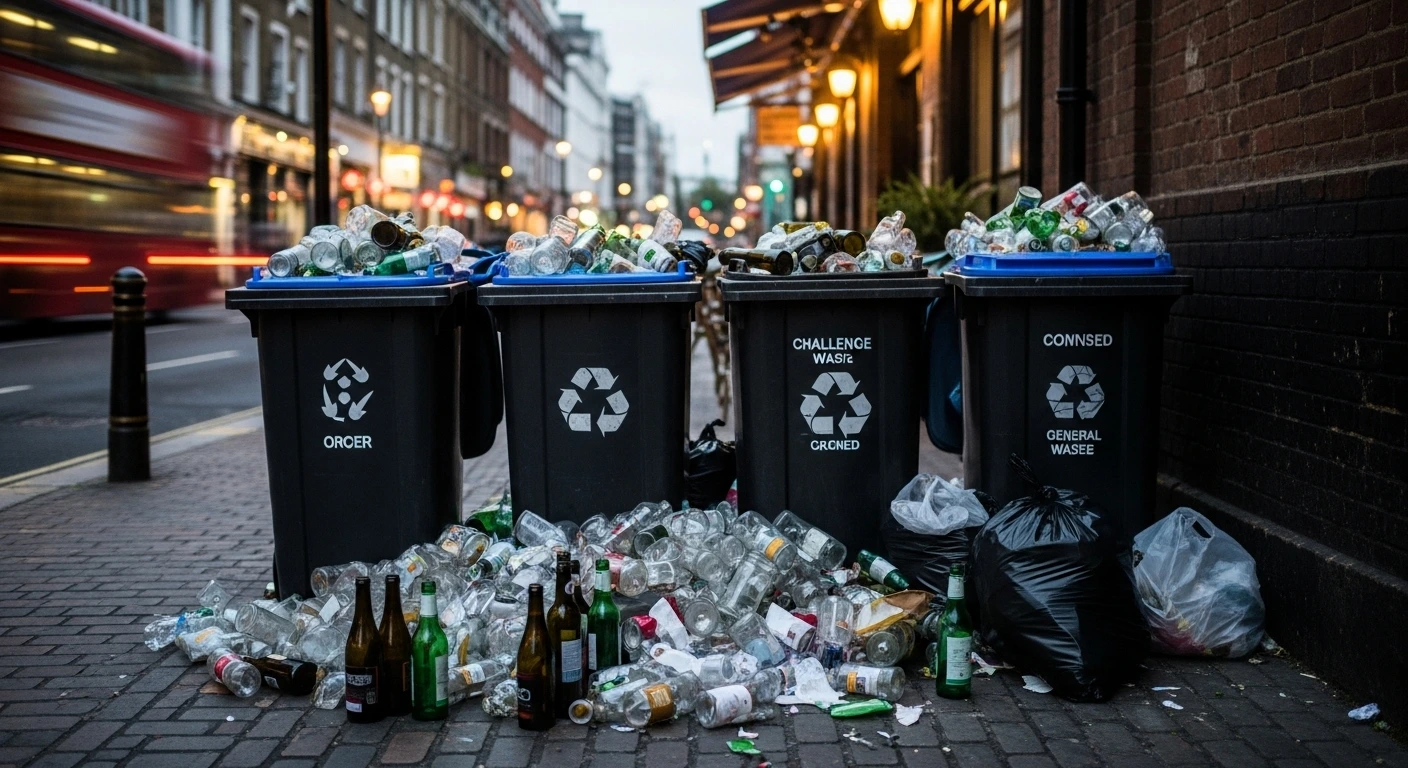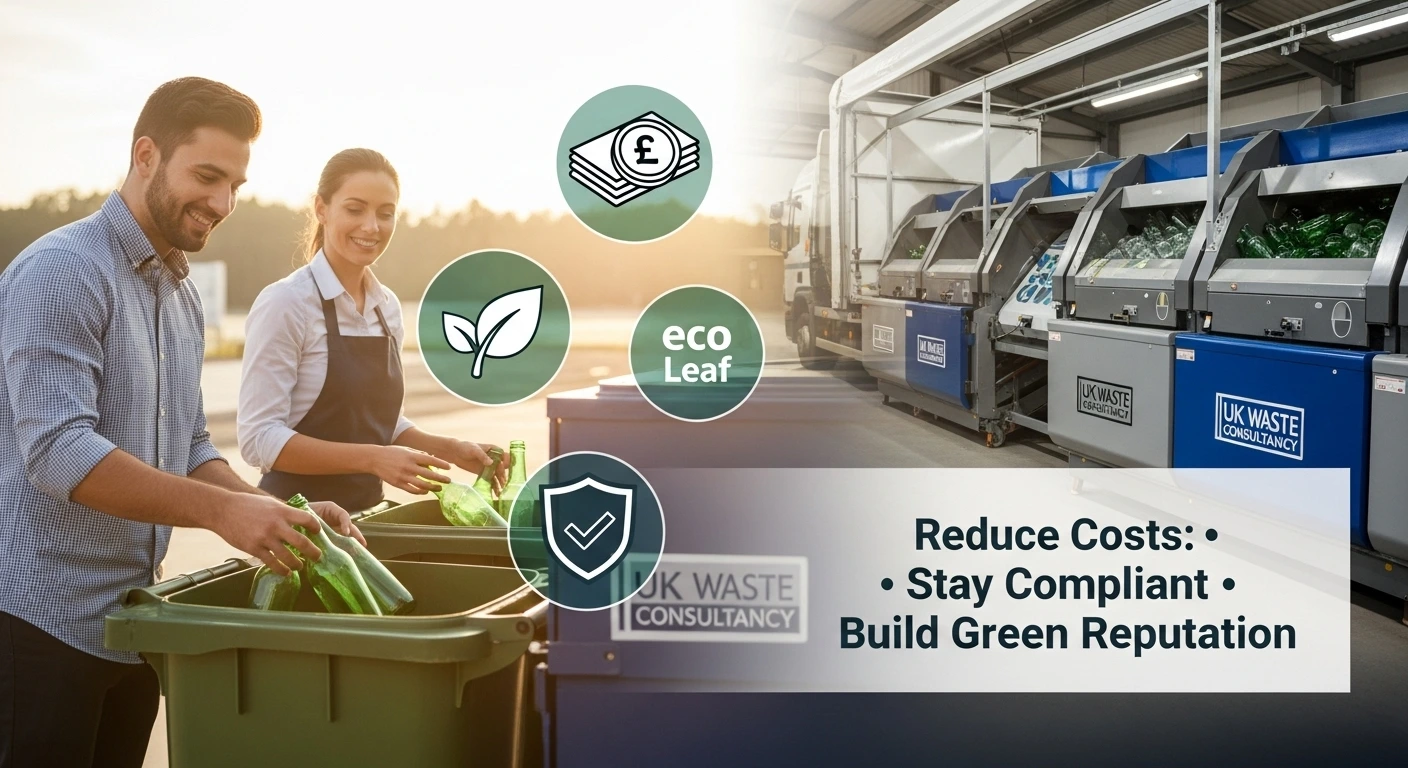Glass Waste in London: Why Proper Recycling Matters More Than Ever
- Home
- Blog

Calmness, laughter, daily challenges, and deadlines are part of the daily routine for every restaurant bar; however, a significant ongoing challenge they face is managing glass waste in London.
Whether it is leftover wine bottles after each dinner service or any glass jar in corporate kitchens, tons of glass waste is being generated every single day. An obvious question here arises—where does it go?
It’s high time that proper glass recycling in London should be implemented seriously after it has been observed that recycling rates are falling. Landfills are overflowing, and the cost for the environment is rising. But here the sense of relief is that more and more local businesses are switching to professional recycling.
With professional experts like UK Waste Consultancy, you get solutions to all your problems. With this blog you will get to know why glass recycling matters, what is going wrong, and what actions London businesses can take for a change.
The Growing Challenge of Glass Waste in London

In a city like London, an enormous amount of glass waste is being generated. Whether we look at pubs, cafes, or any hotel or restaurant, glass waste is being generated daily more than you can ever think.
The biggest reason that landfills are getting filled with glass waste is that this waste is not properly sorted or recycled. This leads to the wastage of valuable resources but slowly and slowly contributes to the pollution and energy consumption.
Key challenges include:
- Poor segregation is contributing to landfills being filled.
- What is more concerning is what could be recycled is mixed with general waste.
- Sometimes we miss the opportunities to reuse valuable materials.
Environmental Impact: Why Glass Recycling in London Must Improve
The cost of ignoring paper and glass recycling in London is concerning, as producing the new glass requires fresh raw materials like sand and soda and the consumption of energy each time. Recycling is crucial, as it saves 30% of the energy by contributing to reducing harmful emissions.
If we look at UK reports, only about 70% of glass is currently being recycled, which means millions of tons of glass waste are still being wasted each year. But if London has to become a clean city, it must meet clean-energy and zero-waste goals.
Now, when strict recycling standards have come into effect, experts like UK Waste Consultancy come up with unique solutions that are helping reduce the glass waste in smarter and easier ways.
Benefits of Professional Glass Recycling Service for Businesses

After reviewing all the statistics, you might be wondering what the real solution is to reduce restaurant food waste UK. How can these food waste numbers be reduced? So, to look for a better solution, we have to see what the causes are first.
Overproduction tops when we talk about the causes. On busy days, too much food preparation leads to food wastage.
Customers over-order the food regardless of whether they can finish it or not. What is the result? Just a waste of money and food both.
An example of wrong consumer behaviour is that around 17% of several meals are not finished but are left uneaten.
A whole lot of peel waste is generated in the form of peels, bones, and trimmings. This really contributes to high volume in the kitchens.
Unnecessary food spoilage can also result from poor storage practices or handling.
TIP: By booking a free site survey with UK Waste Consultancy, you can identify the areas where your biggest food waste issues occur.
Economic and Environmental Impacts
When so many awareness programs are running, people are more aware of what impact climate change and water loss can have. But what people are less aware of is that their food waste is contributing to it in large amounts. To reduce restaurant food waste UK is our moral responsibility. While reducing costs is important, it is equally vital to consider the sustainable impact that food waste reduction can have on our planet.
Food waste collection London contributes to enormous economic losses for businesses. Rising landfills due to food wastage only result in paying more for it. The sector loses £3.2 billion annually. Some businesses pay up to £50,000 a year in landfill costs. So, the initiative to reduce restaurant food waste UK should be the utmost priority.
If we talk about what environmental damage the food waste can have, the list is long. It generates methane gas, which is far more harmful than carbon dioxide and contributes to 8–10% of greenhouse gas emissions. Wasted food shockingly equals the water from 216,000 Olympic swimming pools. Moreover, it attracts pests that also disturb the local ecosystem.
Every country, including the UK, strives to meet its sustainability goals, yet these goals remain unfulfilled due to poor management and rising food waste. This is also the reason to reduce restaurant food waste UK.
8 Proven Strategies to Reduce Food Waste
Managing glass responsibly isn’t just smart; a glass recycling service makes handling the waste simple, easy, and more sustainable.
Top benefits include:
- Cost efficiency: Recycling can give you good potential rebates with the additional benefit of reduced waste disposal.
- Improved reputation: Now with increased awareness, customers are getting sensitive towards the environment. Businesses that value eco-friendly practices are trusted by customers.
- Legal compliance: Waste rules and regulations keep changing. Stay updated with London’s waste regulations.
- Environmental contribution: It significantly contributes to reducing pressure on landfills.
UK Waste Consultancy is an expert in recycling services to manage commercial glass collection.
How London Businesses Can Take Action on Glass Waste
Small and consistent efforts to reduce and recycle glass waste in London are enough to manage glass waste in London. Every business can contribute to cleaning London.
Simple steps include:
- First, start by separating recycling bins for glass.
- Hire licensed providers for proper commercial glass collection.
- Training the staff carefully so that proper waste regulation can take place.
- Hire trusted experts like UK Waste Consultancy for professional guidance.
If businesses are successful enough to make waste management a regular part of their daily tasks, then every business can turn everyday waste into valuable and reusable material.
Conclusion: Building a Cleaner Future Through Smart Glass Waste Management
Glass waste management in London is not an option anymore; it is a must-do if London as a city has to build itself as a cleaner city.
UK Waste Consultancy stands ready to help every organisation take meaningful steps toward sustainability. Together, we can make glass waste in London part of the solution, not the problem.
